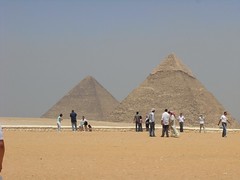
The Pyramids of Egypt are among the largest structures ever built and constitute one of the most potent and enduring symbols of Ancient Egyptian civilization. Most were built during the Old and Middle Kingdom periods.
Originally uploaded by Pan-African News Wire File Photos
Courtesy of the Nigerian Guardian
ARCHAEOLOGISTS have uncovered ancient wooden coffins in what appears to be a royal burial ground near the necropolis of Abydos in southern Egypt, the state-run MENA news agency reported.
The agency said that the discovery, made by a team from the Supreme Council of Egyptian Antiquities, could be dated back to the Old Kingdom (3,000 B.C.), the golden age of pyramid building in ancient times.
The team "has found what could be a royal complex of 13 tombs of different shapes and sizes that could have belonged to high officials from that period or people who contributed to building these tombs," MENA said.
The agency said that human bones were found inside the coffins, although it did not specify how many coffins were discovered.
Objects made out of ivory similar to pieces used for playing chess were also found. MENA said only one other similar board game has been found in Egypt and that was among the fabled treasures of the legendary boy king Tutankhamun.
The discovery of Tutankhamun's intact tomb by British archaeologist Howard Carter in 1922 near Luxor in southern Egypt caused an international sensation because of the value and quality of its contents
Meanwhile, the family of former Egyptian President Anwar Sadat has threatened to sue the Iranian producers of a documentary film portraying his 1981 assassination as the killing of a traitor by a martyr.
The documentary, entitled "Assassination of a Pharaoh," has already been shown on Iranian television, the Al-Masry al-Youm newspaper reported.
The film, broadcast "in honour of the martyrs of the Islamic renaissance," deals with "the revolutionary assassination of the treacherous Egyptian president at the hands of the martyr Khaled Islambouli," the paper said.
Islamic militant Islambouli was one of the soldiers who shot Sadat dead at a military parade in Cairo on October 6, 1981. He was hanged for the killing in 1982 and subsequently had a Tehran road named after him.
The Iranian film says Sadat was killed for signing the 1978 Camp David Accords that led to a 1979 peace treaty with Israel, the first by an Arab country.
No comments:
Post a Comment